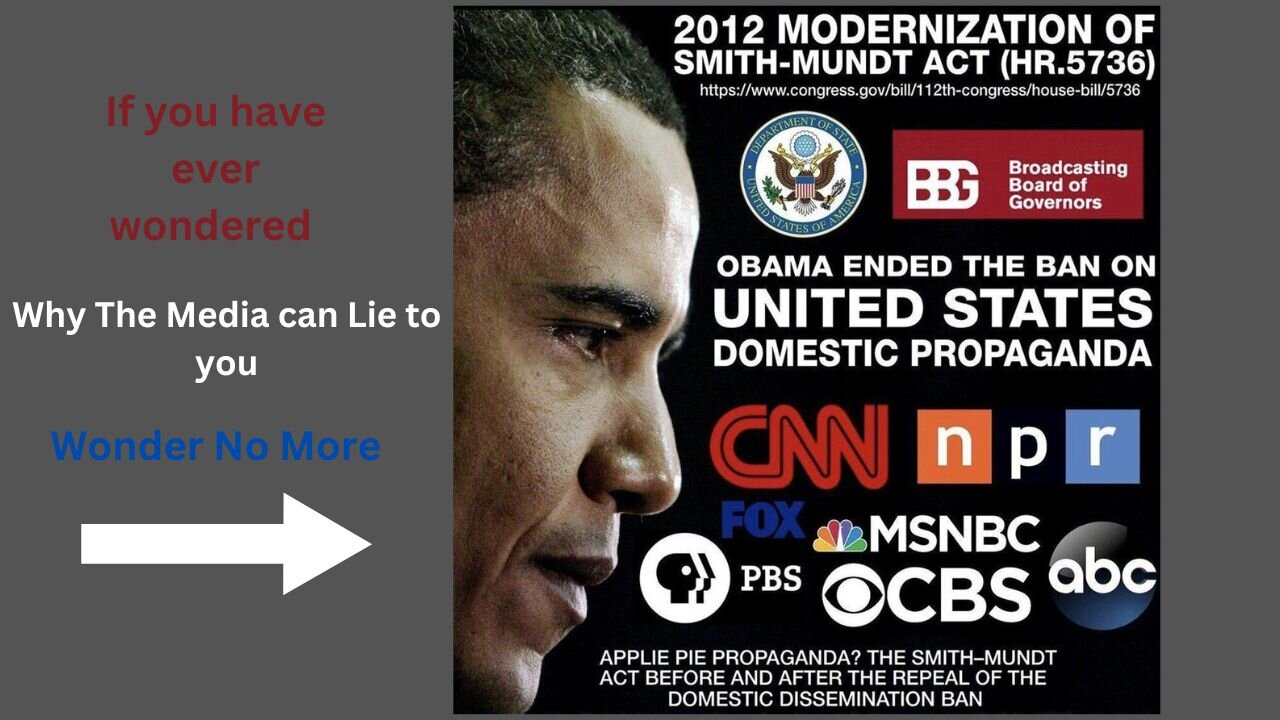Premium Only Content

The Main Street Media Lies 24/7
If you have every wondered how the Media is allowed to lie and twist the truth to The American People. Here is your answer.
The Smith-Mundt Act of 1948 was originally enacted to authorize the State Department to communicate directly with foreign audiences through various means like broadcasting, cultural exchanges, and publishing. This Act was part of a broader effort during the Cold War to spread information about the United States and counter Soviet propaganda. A key aspect of this Act was a prohibition on domestic dissemination of information produced by the State Department for foreign audiences, essentially aimed at preventing the U.S. government from propagandizing its own citizens.
The Smith-Mundt Modernization Act of 2012 significantly altered this aspect. Here's what changed:
Domestic Dissemination: The Modernization Act allowed materials produced by the State Department and the Broadcasting Board of Governors (BBG), intended for foreign audiences, to be made available within the United States upon request. This was seen as a move towards transparency and aimed to make U.S.-funded information accessible within the U.S. borders if requested.
Purpose and Misconceptions: The change was meant to improve transparency and counter anti-American sentiment at home by allowing Americans to see what information was being disseminated abroad. However, it sparked concerns and misconceptions that it now legally allowed the U.S. government to propagandize its citizens, which isn't entirely accurate but reflects worries about government information control.
Public and Media Reaction: There's been a mix of reactions, with some viewing the change as an erosion of the barrier against domestic propaganda, suggesting that the government could now legally engage in misinformation internally. Others see it as a necessary step for transparency in an era where information control and dissemination have transformed due to digital technology.
Legal and Ethical Implications: Critics argue that this change potentially opens the door for the U.S. government to influence public opinion covertly, a significant shift from the original act's intent. Proponents highlight that the Act still requires clear attribution of government-produced content, aiming to maintain transparency about the source of the information.
In summary, while the original Smith-Mundt Act aimed to prevent domestic propaganda by restricting the dissemination of government-produced foreign-targeted information within the U.S., the 2012 Modernization Act relaxed these restrictions, sparking a debate over government transparency versus the potential for domestic propaganda. The change reflects broader discussions on information warfare, government communication, and public trust in the digital age.
-
 11:24
11:24
ChrissClassicClips
25 days agoNCS America Canada
18015 -
 LIVE
LIVE
SilverFox
1 hour ago🔴LIVE - ELDEN RING - ZERO DEATH CHALLENGE - ATTEMPT 5
92 watching -
 17:17
17:17
SantaSurfing
4 hours ago4/8/2025 - Modern Day Wealth Managers! The Rewards of planning and dreaming big!
3.82K14 -
 26:40
26:40
Producer Michael
8 hours agoI WAS ROBBED IN MY NEW HOUSE!
921 -
 13:00
13:00
SKAP ATTACK
3 hours agoMichael Malone FIRED by Nuggets
451 -
 1:11:45
1:11:45
NucleoNick
23 hours ago🟢LIVE NOW! The Legend of Zelda: Skyward Sword - Part 8🟢
5 -
 DVR
DVR
Slightly Offensive
1 hour ago $1.65 earnedShould THEY Be Able to Use SELF-CHECKOUT? | Guest: Hermes
6.19K3 -
 LIVE
LIVE
Adam Does Movies
9 hours agoLet's Talk Movies! Ask Me Anything - LIVE!
292 watching -
 LIVE
LIVE
AlaskanBallistics
11 hours agoI love this Gun PodCast #25
43 watching -
 LIVE
LIVE
Anthony Rogers
6 days agoEpisode 360 - Document Leaks
42 watching